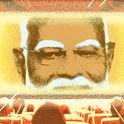The French philosopher Simone Weil (1909-1943) had a precocious gift for sympathy—and more than a hint of masochism. She sought out the darkness to escape the comfortable bourgeois life—the very model of assimilated Third Republic French-Jewish success—into which she was born. When she was ten years old, in 1919, she disappeared from her Paris apartment only to be found marching down the Boulevard Saint Michel with striking workers, singing The Internationale. On holiday before her last year at the École Normale Superièure—where she would graduate first in her cohort, ahead of Simone de Beauvoir—she toiled on a fishing trawler in Normandy. In 1932, she went down a coal mine and was nearly shaken to pieces when she tried the pneumatic drill.
Weil definitively left her privilege behind in 1934, when she took a leave of absence from teaching philosophy at a provincial lycée in Roanneto work at different factories in Paris. There she learned first-hand how “not thinking anymore... is the one and only way of not suffering.” Weil’s clumsiness made her factory career difficult—though it also probably saved her life. Her brief stint with the French-speaking Internationals in the Spanish Civil War (“Happily, I am so myopic that there’s no risk of my killing others,” she wrote, “even when I am aiming at them”) was cut short when she stepped in a pot of cooking oil and was forced back to Paris.
After her family fled the Nazi invasion of France, Weil became obsessed by the idea of parachuting behind enemy lines with a brigade of nurses. Her suicidal proposal was rebuffed be de Gaulle; instead, she was tasked with preparing reports on the political and spiritual reconstruction of France. In 1943, she died of tuberculosis aggravated, the coroner found, by her self-imposed malnutrition: she insisted on never eating more than was permitted in her occupied homeland. Her family called her Antigone; her classmates, the “Categorical Imperative in Skirts.”
In her brief life, Weil was more of a teacher than a writer—at the lycée, at workers’ reading groups, and with the fishermen and farmers whom she tutored in languages and literature when the day’s work was done. Yet Weil still wrote intensely. Virtually none of her writings appeared in her lifetime, with the exception of her justly famous essay “The Iliad, or the Poem of Force,” which was published in Vichy France in 1940, and which remains her most accessible work.
Her books were all compiled by others, stitched from the essays, letters, and notes she left behind into Waiting for God and Gravity and Grace on her mystic theology, and The Need for Roots on her political theory. Thinkers as diverse as Albert Camus, Pope Paul VI, Iris Murdoch, Jacques Derrida, Susan Sontag and Franz Fanon cite Weil as an influence. Her posthumous productivity—as a thinker and as a myth—makes her hard to pin down.
“To a rare degree in the modern age—or, indeed, any age—Simone Weil fully inhabited her philosophy,” writes Robert Zaretsky, in his welcome new book, The Subversive Simone Weil. Drawing on Simone Petrément’s still-unequalled 1973 vie, Zaretsky approaches Weil by essaying “a small number of core themes in her thought that still resonate today”—affliction, attention, rootedness, resistance and the divine. These themes give a sense of the remarkable scope of the work she packed into a mere 33 years. In clear, accessible prose, Zaretsky gives some coherence to Weil’s largely fragmentary oeuvre. What emerges is a portrait of a politically unclassifiable thinker who in her life and writings committed herself to be open to the unbearable reality around her.
Weil’s year-long apprenticeship in Paris factories transformed her early Marxist tendencies into something more sophisticated—and arguably more radical. “Every man’s work should be an object of contemplation for him,” Weil wrote, anticipating Hannah Arendt’s later distinction between meaningful work and mere labour. This spiritual approach to oppression led Weil to develop, as Zaretsky writes, “a fundamentally conservative, if not reactionary, conception of ‘revolution’ and ‘resistance’.” Weil believed not so much in creating a new form of life, but in restoring many aspects of the one industrialisation had swept away. As TS Eliot observed, Weil was “at the same time more truly a lover of order and hierarchy than most of those who call themselves Conservative, and more truly a lover of the people than most of those who call themselves Socialist.”
Ideology was, for Weil, less important than suffering. Modern factory work—endlessly repetitive, frantically rushed—induces what she termed le malheur, often translated as affliction: a condition as “hideous as life in its nakedness always is, like an amputated stump, like the swarming of insects.” We look away instinctively from the hollow stare of an exhausted worker, just as we look away from the bloody workings of war—two sorts of dehumanising violence, in Weil’s view. Force, as Weil writes in her essay on the Iliad, “turns anyone who is subjected to it into a thing. Exercised to the limit, it turns man into a thing in the most literal sense: it makes a corpse out of him.” War and work destroy the complex sensibility that makes us human.
Weil thought that educating workers to read the classics and to express themselves clearly was more important than fomenting revolution. Education fosters attention, which for Weil is a life-expanding “negative effort,” a kind of negative capability with which we approach the world as though translating a “text that is not written down.” Whether for a worker or an intellectual, as Zaretsky writes, for Weil the “epistemological is the ethical”; being open and available to others is the only way to fully respect them, and the only way to be fully human.
Human beings also need to be enmeshed in a community—to have the roots that modernity and war were pulling up. To be rooted means to preserve, Weil writes, “certain particular treasures of the past and certain particular expectations of the future”—the ultimate function of the nation, in her Burkean view. (Notably, Roger Scruton included Weil in his Great Tradition.) The distinctive condition of modern life is déracinement, or uprootedness—“a sort of inner vertigo” deeper and more elusive than alienation. Uprootedness comes with the physical displacement forced upon her and her family by the Nazi aggression—a kind of physical and spiritual colonisation which she boldly asserted was identical to what the French were perpetrating in trying to Gallicise their colonial subjects.
Weil’s worldview became progressively more religious, and in the ‘30s she drifted further from her upbringing as a “fiercely nonobservant” assimilated Jew and drew closer to Christianity. Although she refused allegiance to any church, Zaretsky relates how Weil “engaged in a brilliant and often bruising dialogue with Christianity” from her first experience of grace in a Romanesque chapel in Assisi in 1937, when she felt a divine force drive her to her knees to pray.
Like so much else in her life, Weil’s Christianity took the form of self-denial—not just of her ties to Judaism, which she relentlessly denigrated as a brutal, ungodly force in history, but also of her own ego. “Relentless necessity, wretchedness, distress, the crushing burden of poverty and of labor which wears us out, cruelty, torture, violent death, constraint, disease—all these constitute divine love,” Weil wrote, describing her version of what the Gnostics call kenosis. “It is God who in love withdraws from us so that we can love him.” In order to approach the divine, we must undergo a process of décréation, an undoing of the fundamental separation that occurred when God created the world. We must overcome the separation by overcoming ourselves.
One need not be a Christian to see the value in Weil’s attempt to, in Iris Murdoch’s words, “pierce the veil of selfish consciousness and join the world as it really is.” Nor does one need to be a philosopher to see that, despite her sometimes esoteric worldview, Weil’s serious commitment put her in the company of Socrates as one of the great practitioners of philosophy as a way of life. Weil’s example—if not her creed—is a reminder in a secular and individualistic age what it means to live for what you believe.
The Subversive Simone Weil: A Life in Five Ideas by Robert Zaretsky (Chicago)












